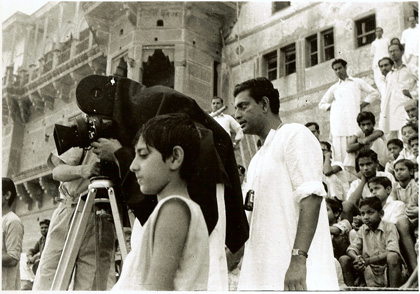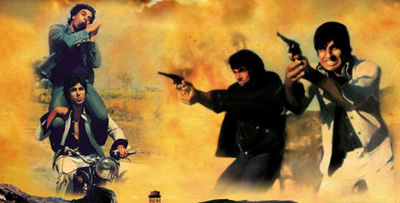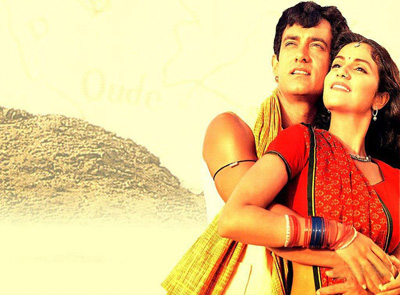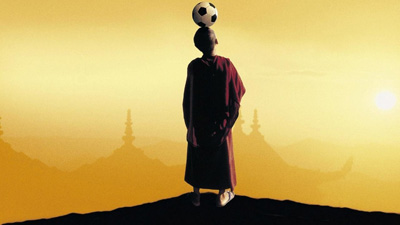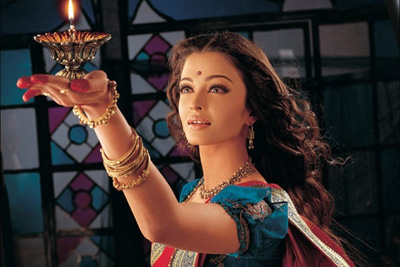

 |
REPRESENTING Films constitute the most vibrant mirror of South Asian culture and societies. This series of sixteen films, including commercial, ‘alternative’ or ‘art’ and experimental short films, brings together a broad spectrum of South Asian film in all its diversity. Indian film is a highly influential cultural phenomenon, meaningful not only to Indians, Pakistanis and Bangladeshis, but also Middle Eastern, Southeast Asian, African and Eastern European people. It is also a primary window through which people in the larger South Asian diaspora in the United States and Canada maintain their connection to their worlds of origin. Selections from Bengali, Tamil and Malayalam films, offbeat and independent films, the Parallel Cinema, and shorts, as well as the better-known productions of “Bollywood,” are showcased in the series. While Bollywood has great appeal in the popular imagination, the virtuosity and sophistication of Indian filmmaking as a whole is less known or appreciated except by cinephiles and specialists in South Asian culture. The films have been selected on the basis of their historical and cultural significance, critical reception, and artistic excellence. Three panels involving major scholars of cinema and society, filmmakers, faculty and students from Queens College are open free, along with the films. The panels and films highlight themes that have concerned South Asian directors and audiences over the years such as gender, political rights, urbanization, and identity and cosmopolitanism in rapidly changing societies. They also draw attention to distinctive aspects of the work of specific directors and actors, such as Satyajit Ray, Mani Ratnam, Amitabh Bachchan and Shabana Azmi. The program is sponsored in collaboration with the Kupferberg Center for the Visual and performing Arts and the Departments of History, Economics, Media Studies, and Classical, Middle Eastern, and Asian Languages and Cultures, as part of Queens College’s “Year of India.” It was assembled by the Film Committee of the Year of India at Queens College, Serinity Young, Amy Winter, and Satadru Sen.
REPRESENTING SOUTH ASIA
ON FILM, PART I September 12-December 5, 2012 All screenings and programs take place on
September 12: Speakers:
A reception will follow October 3: October 10: October 17: Ray’s masterpiece of social decadence and political intrigue, and a brilliant satire of a key moment in the British conquest of India. October 24: A young couple befriends a lonely old Anglo-Indian woman so that they can use her home as their love nest. One of the first major Indian films by a woman director, and a nuanced study of callousness, intergenerational relations and class in modern India. October 31: Gopalakrishnan’s most acclaimed work, this Malayalam film about acceptance and rebellion examines a man and his three sisters living in feudal Kerala. November 8:
These short films examine the attempt of people to live with dignity under the threat of state violence. Panel: “The Cultural Politics of the National Security State” Panelists:
Moderator: Satadru Sen, History Dept., QC December 5: Based on the novel by Jhumpa Lahiri, this film focuses on a family of Indian immigrants in contemporary America. Part love story, part family tragedy and part immigration epic, this is probably the best example of the cinema of the Indian diaspora. A round-table discussion follows REPRESENTING SOUTH ASIA
ON FILM, PART II February 6-April 24, 2013 All screenings and programs take place on
February 6: Introduction to the program in Himalayan Studies Minor: William McClure, Dean of Arts & Humanities and Professor, Classical, Middle Eastern & Asian Languages & Cultures. February 13: The second, and perhaps the best, of Ray’s famous Apu Trilogy, the film follows Apu as he leaves home for school. A narrative of the complex interplay of social change, family ties and freedom. February 20: One day in the life of a lower-middle-class Calcutta family. The daughter who supports the family has not come home from work, and imagination and anxiety run wild in this taut drama about gender roles and class values. February 27: A Eurasian family is kidnapped by rebels during the ‘Sepoy Mutiny’ of 1857, only for the kidnapper to become infatuated with the young daughter of the family. One of the best films to come out of the Parallel Cinema movement of the 1970s and 1980s, and a reflection on race, war and colonialism. April 3: April 10: The first part of the Calcutta trilogy based on the novel by Sunil Gangopadhyay. This film is set during the period of the naxalite movement in Bengal, and tells the story of Siddharta, an educated middle-class man caught within the turmoils of social unrest. Corruption and unemployment is rampant, and Siddhartha cannot align himself with either his revolutionary activist brother, or career-oriented sister. April 17: Mani Ratnam’s gangster classic of Tamil cinema about a boy who sees his father gunned down by a policeman. April 24: Closing event
Museum Hours Please note that the museum, located in Klapper Hall, Room 405, is not open on holidays and when the college is closed. Admission is free. For directions to Queens College, please visit: http://www.qc.cuny.edu/welcome/directions/Pages/default.aspx Please call the museum for updated programs and schedules or re-visit this website www.qc.cuny.edu/godwin_ternbach for further information. |
